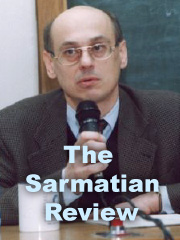| This Issue | Back Issues | Editorial Board | Contact Information |

BOOKS Received
April 2004
Volume XXIV, No. 2
Dwa bunty [Two rebellions], by Jerzy Narbutt. Edited with an introduction by Waldemar Zyszkiewicz. Katowice: Unia (unia@cyberia.pl), 2003. 159 pages. Paper. In Polish.
A collection of essays by one of Poland's foremost essayists. Many had been published in various cultural and political periodicals, and all are characterized by Narbutt's supreme ability to walk the middle of the road, avoiding any kind of fanaticism/extremism and holding fast to a Thomistic and soberly Catholic Weltanschauung. Those addicted to the dialectic of history will find some of the essays simplistic or one-sided, but even they will not be able to put the book away until they read it from cover to cover. Narbutt's books generally command this kind of attention. One may disagree with them, but one cannot stop reading them. What a talent, and what a sober mind.
The two rebellions referred to in the title are the rebellion against authority accomplished during the Reformation, and the rebellion against reality accomplished by modernist and postmodernist philosophers. Narbutt thus joins philosophers such as Alasdair MacIntyre, Jacques Maritain, and Mortimer Adler in his rejection of subjectivism. He encourages mutiny against the postmodernist paradigm which rejects the very notion of value and such traditional values as heroism, moral probity, and sacrifice.
The genre favored by Narbutt is the short essay, the kind initiated by Montaigne in the sixteenth century and practiced in western and central Europe until the nineteenth century; it later morphed into feuilleton and newspaper column. Accordingly, Narbutt's meditations are titled "On appearances"; "On contempt"; "Conscience"; and so forth. They read extremely well and make wonderful bedtime reading.
Obóz pracy w Swietochlowicach w 1945 roku: dokumenty, zeznania, relacje, listy, edited by Adam Dziurak. Warsaw: Institute of National Memory and Committee Investigating Crimes against the Polish Nation, 2002. ISBN 83-915983-6-5. Index, tables. 247 pages. Hardcover.
A collection of hard data concerning the concentration camp set up in Soviet-occupied Poland by its Soviet-appointed authorities in 1945. The camp's commander, Salomon Morel, emigrated to Israel in 1992. The Polish government has sought his extradiction for years, unsuccessfully so far. He is accused of crimes against humanity for which there is no statute of limitations.
In addition to original reports, lists, and documents written by camp officials, the volume contains several dozen depositions of survivors. The depositions contain detailed descriptions of beatings and brutalities by the camp authorities. While most of the camp's inmates were German, about one-third were Polish, and their "crime" was being anti-Soviet. Some American citizens, such as Wanda Langler, died there, and children as young as one year of age were incarcerated. The åwietochlowice concentation camp operated for nine months. It was closed by the order of the government, and prisoners were shipped to other prisons and camps. Out of the estimated six thousand men, women, and children incarcerated there, one-third died in the camp. Those who survived were intimidated to the point of keeping silent about the conditions in the camp throughout the period of the Soviet occupation of Poland. The depositions contained in this book were given in the 1990s when the Soviet army was out of Poland.
Other Books Received
Trzecia czesc, by Krzysztof Koehler. Kraków: Wydawnictwo Literackie (www.wl.net.pl), 2003. ISBN 83-08-03400-4. 81 pages. Paper.
A new volume of poetry by a poet once associated with the bruLion group.
Parafie Ostrowca Swietokrzyskiego, by Rev. Tadeusz Lutkowski. Sandomierz: Wydawnictwo Diecezjalne, 2001. 118 pages. Numerous photographs, documents, and notes. ISBN 83-7300-066-6. Hardcover.
This finely composed history of the St. Michael Parish in Ostrowiec Swietokrzyski begins in 1597. Of interest is a recorded diary of the persecution and harassment which this one parish had to undergo in Communist times in Soviet-occupied Poland.
Universitas Studiorum Silesia Anno MMIII, edited by Zbigniew Kadlubek. Katowice: Wydawnictwo Uniwersytetu Slaskiego ul. (Bankowa 12B, 40-007, Katowice, Poland), 2003. 168 pages. Paper. Bilingual in Polish and English.
A well-prepared university catalog, American-style, minus the actual list of courses. Would that all Polish universities distributed this kind of catalog. This one, was published in 1,000 copies and was printed on expensive paper, so it is not easily or freely available. Wish the paper were worse and the distribution more generous.
Rocznik Polskiego Towarzystwa Naukowego na Obczyznie, 2001/2002, edited by Krzysztof Rowinski. Vol. XLV. London: PTNO (238-240 King Street, London W6 0RF), 2003. 509 pages. In Polish and English, summaries in English.
Articles by Polish emigré scholars on a variety of topics. This Polish Scholarly Society played a significant role among those post-World War II emigrés who could not return to Soviet-occupied Poland.
Back to the April 2004 Issue
The Sarmatian Review
sarmatia@rice.edu
Last updated 4/23/04